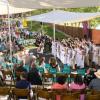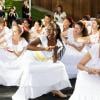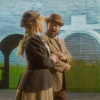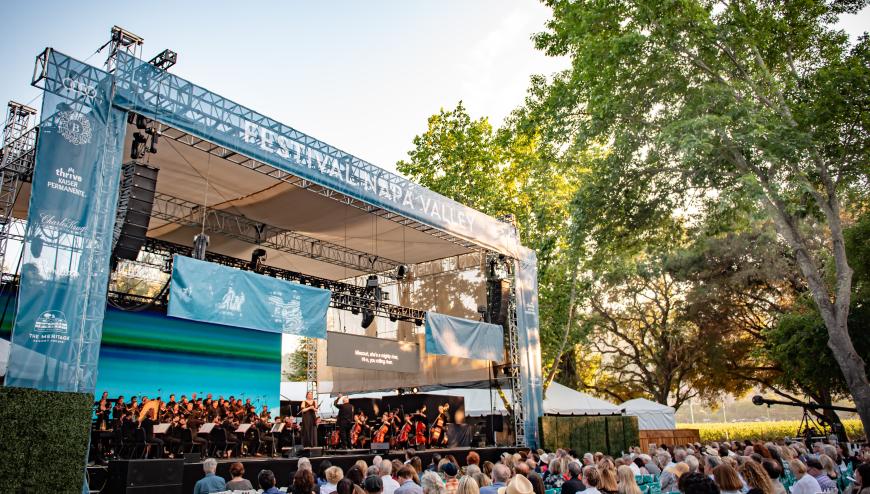
Early last Tuesday evening, Riana Mondavi, on the Festival Napa Valley stage at her family’s Charles Krug Winery in St. Helena, expressed her relief that things had “cooled down” since the festival’s opening night. Tuesday’s concert, on the theme of “Seasons of Hope,” took the audience, arrayed in shirt sleeves and summery dresses, through contrasts as dramatic as those between the benign microclimate of Napa County and the fogged chill of San Francisco.
The program began with Lera Auerbach’s Symphony No. 6 (“Vessels of Light”), premiered in 2022. The 50-year-old Russian-born Jewish composer dedicated this work to Chiune Sugihara, a Japanese diplomat stationed in Lithuania during the Second World War, whose courageous issuance of transit visas saved the lives of thousands of Jews fleeing Nazi- and Soviet-occupied Eastern Europe. Structured in four parts with interludes, the symphony somewhat resembles an oratorio in its thematic mission and parts for four vocal soloists and chorus. The text shared by the singers is a compendium of Jewish poetry, delivered in Yiddish, with English translations projected above the stage Tuesday.
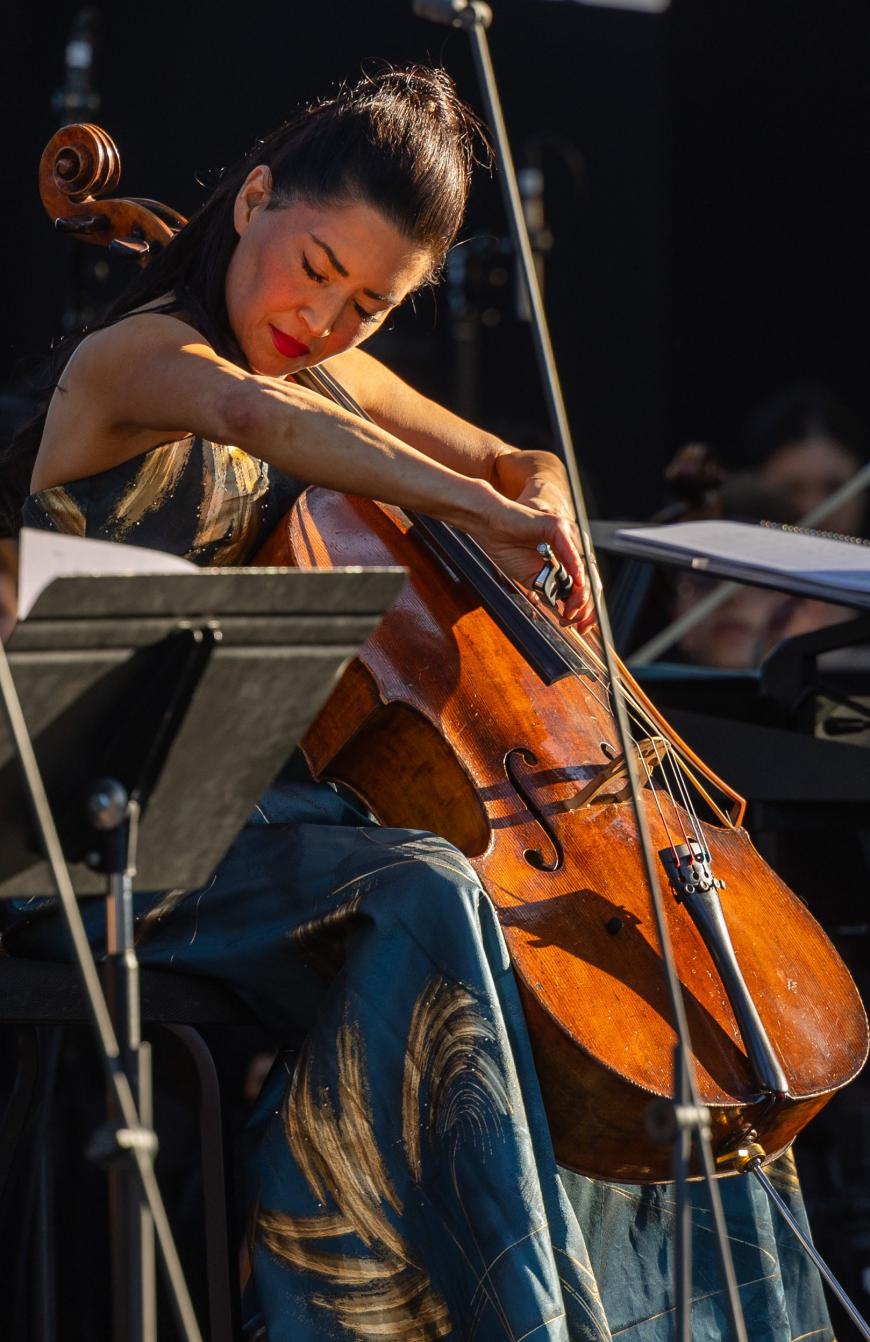
A prologue introduces the prominent role of solo cello, here performed by Kristina Reiko Cooper, and a pair of Whisperers, male and female, who intone hushed portions of the text. Festival Orchestra Napa and Festival Napa Valley Volti Chorale followed with the first of the symphony’s parts. The dramatic impact of the text, telling of loss, longing, forced travel, and faith, was irresistibly conveyed both by the vocalists and by Cooper’s startling command of extended techniques, including strident bowing, scratch tone, and sul ponticello.
As in Arab-influenced modes like klezmer, the music at times seems microtonal, the choral voicings also evoking Alban Berg’s Lulu. This was not easy listening, with both tonal centers and compositional structure being difficult to determine and the urgency of the text seeming rather relentless. Even affirmative passages such as “my farewell greetings resound for the living” sounded rather doleful. Still, the spectral lamentation shared by soloists and chorus was impressive.
Credit Cooper for taking on the demands of the work, her virtuosity showcased in an extended solo epilogue, which drew a standing ovation. Among the vocal soloists, mezzo-soprano Julianna Smith channeled the emotional challenge affectingly, and baritone Clinton Garrison found warmth and fluidity. The Whisperers, Stephanie Lynne Mason and Matthew “Motl” Didner, effected a tangible human touch.
Launching a set of pieces by Gordon Getty, soprano Lisa Delan and the Volti Chorale sang the composer’s arrangement of the familiar folk song “Shenandoah.” (Editor’s note: Getty is a funder of SF Classical Voice.) Delan’s fresh, sparkling vocal floated prettily, with effortless legato and sustained notes, above Getty’s lustrous voicings of the lower strings. The delights of this newest of the composer’s several arrangements of the song (Delan recorded an earlier iteration on her 2016 Pentatone album Out of the Shadows) included the chorus’s enchanting delivery of the second verse and a charming string interlude following the third verse.
The Volti Chorale premiered Getty’s setting of the Scottish folk tune “Annie Laurie,” for which he’d seamlessly interpolated some additional lyrics. The romantic intent was rendered irresistible, decorated with a marvelous interlude for two harps, dipping briefly into the minor mode.
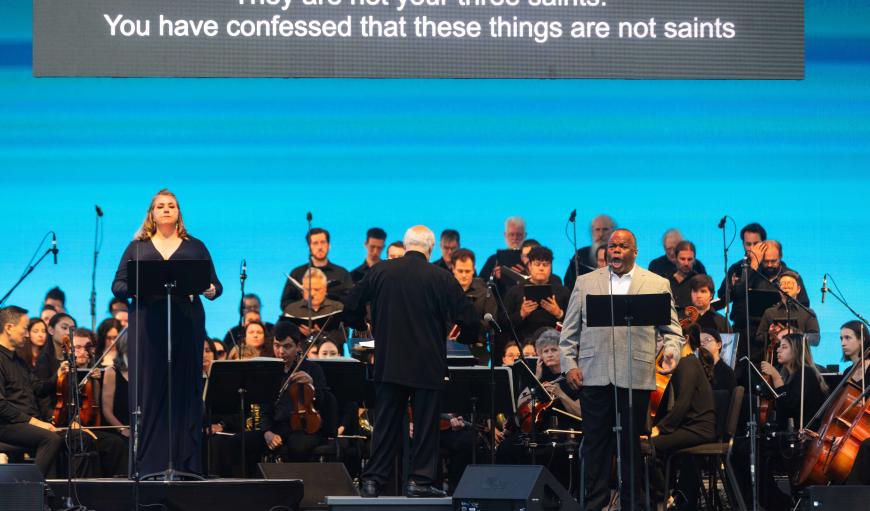
The concert finished with a full rendering of Getty’s Joan and the Bells, a cantata on the 15th-century trial and punishment of Joan of Arc by Pierre Cauchon, the Bishop of Beauvais, recorded on Pentatone with Delan and Vladimir Chernov in 2003. The lead roles were sung here by soprano Melody Moore and baritone Lester Lynch. Against Getty’s roiling orchestration, Lynch moved convincingly from ascribing witchcraft to the youth to imploring her repentance, his vocalization strong in sustained notes and diction. Moore, in turn, was audibly impacted by the accusation but confident in her faith, her talent and experience as a lyric soprano in evidence. With this work, Getty, ever his own librettist, has created fine dramatic dialogue in both words and music. He also effectively deploys the chorus as monks and townspeople a la Benjamin Britten.
As in his operas, Getty excels here in his illumination of the theatrical potential of brass and woodwinds. For this performance, the capable Volti Chorale seemed to revel in its commentary, and conductor Constantine Orbelian drove everyone’s dynamics confidently but carefully, as evidenced by his pacing.
Though not a lengthy work, this cantata managed to create a satisfying arc, transporting the audience through transformative changes. Joan’s recounting of her experience of the bells was lovely in its orchestral and vocal setting, prompting Cauchon to a recollection of his own similar youthful experience. The townsfolks’ calling out to Joan, in dactylic meter, was nothing short of artful poetry and transcendent composition.


